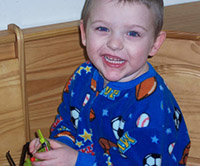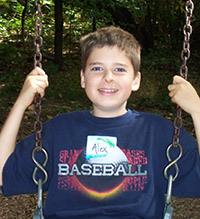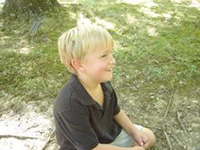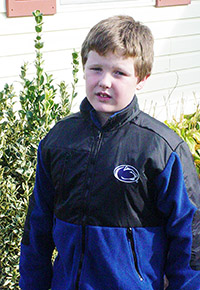Autism Diagnosis
 According to the Centers for Disease Control and Prevention (CDC) the current incidence of autism is about 1 in 110, more common than Type 1 Diabetes or Down Syndrome. Screening for Autism Spectrum Disorders (ASD) is becoming more effective at detecting the condition at a young age. The earlier ASDs are diagnosed, the sooner the child can receive the special supports that they need. Research shows that early diagnosis and intervention are crucial for helping people with ASD achieve their social, education, and vocational potential.
According to the Centers for Disease Control and Prevention (CDC) the current incidence of autism is about 1 in 110, more common than Type 1 Diabetes or Down Syndrome. Screening for Autism Spectrum Disorders (ASD) is becoming more effective at detecting the condition at a young age. The earlier ASDs are diagnosed, the sooner the child can receive the special supports that they need. Research shows that early diagnosis and intervention are crucial for helping people with ASD achieve their social, education, and vocational potential.
People on the autism spectrum may receive a diagnosis at any age. Many people with autism are diagnosed as children when they fail to meet specific developmental milestones, such as spoken language and social communication. Some individuals with high functioning autism may not be diagnosed until they are in their teen or adult years when they experience social, educational, or vocational difficulties. No matter their age, there are treatments available to help people with autism function successfully in the world.
Please contact us to receive an autism checklist that can help you get the evaluation process started.
Early Detection, Early Treatment
 The diagnosis of autism may be made by a psychologist (PhD or PsyD) or a psychiatrist (MD). Since diagnosing ASD is a specialty, make sure that this professional has experience diagnosing people with autism. Autism is a spectrum, so it is also important to find a clinician who is familiar with the individual’s particular expression of the condition. For instance, if you are seeking a diagnosis for your daughter, look for a professional who has diagnosed girls as well as boys.
The diagnosis of autism may be made by a psychologist (PhD or PsyD) or a psychiatrist (MD). Since diagnosing ASD is a specialty, make sure that this professional has experience diagnosing people with autism. Autism is a spectrum, so it is also important to find a clinician who is familiar with the individual’s particular expression of the condition. For instance, if you are seeking a diagnosis for your daughter, look for a professional who has diagnosed girls as well as boys.
The earlier the diagnosis of autism is made, the sooner interventions can begin. Evidence over the last 15 years indicates that intensive early intervention for at least 2 years during preschool results in improved outcomes in most children with autism. This is because the brain is most able to change when young.
Because people with autism process information at up to one third slower than those without, all learning is delayed. Early intervention gives children with autism additional training in social skills and academics, helping them to keep up with their peers.
Autism Screening
 Clinicians rely on behavioral characteristics to make an autism diagnosis. Information may be gathered from family members, teachers, therapists, and medical professionals. The best diagnosis comes from a team approach.
Clinicians rely on behavioral characteristics to make an autism diagnosis. Information may be gathered from family members, teachers, therapists, and medical professionals. The best diagnosis comes from a team approach.
At your child’s routine well-child checkup, make sure to request that you pediatrician perform a developmental screening test. Your observations and concerns about your child’s development are essential in helping to screen your child. If you are unsure about what developmental milestones your child should be achieving at what age, you can read the CDC’s list of milestones for the first five years to see if your child is at risk for a developmental delay. If you child is older, it may be helpful to review family videotapes, photos, and baby albums to remember when each behavior was first displayed.
Several screening checklists have been developed to quickly gather information about a child’s social and communication development.
These checklists include:
- Checklist of Autism in Toddlers (CHAT)
- Modified Checklist for Autism in Toddlers (M-CHAT)
- Screening Tool for Autism in Two-Year-Olds (STAT)
- Social Communication Questionnaire (SCQ) (for children 4 years of age and older)
These simple checklists may not identify children with mild ASD, such as those with high-functioning autism or Asperger Syndrome. The following tools evaluate children who may have social and behavioral impairments without a significant language delay. These checklists are reliable for identifying school-age children with high functioning autism or Asperger Syndrome:
- The Autism Spectrum Screening Questionnaire (ASSQ)
- The Australian Scale For Asperger’s Syndrome (A.S.A.S.)
- Childhood Asperger Syndrome Test (CAST)
Comprehensive Diagnostic Evaluation
In the second stage of assessment, a more thorough analysis is made to determine the autistic individual’s level of functioning. This evaluation should include neurological assessment along with cognitive and language testing.
These tests include:
- Autism Diagnosis Interview-Revised (ADI-R)
- Autism Diagnostic Observation Schedule (ADOS-G)
- Childhood Autism Rating Scale (CARS)
 The ADI-R is a structured interview that contains over 100 questions and is conducted by a caregiver. It consists of questions that target four topics: the child’s communication, social interaction, repetitive behaviors, and age-of-onset of symptoms.
The ADI-R is a structured interview that contains over 100 questions and is conducted by a caregiver. It consists of questions that target four topics: the child’s communication, social interaction, repetitive behaviors, and age-of-onset of symptoms.
The ADOS-G is an observational guide to assess social and communication behaviors that are often delayed, abnormal, or absent in children with ASD.
CARS helps to evaluate the child’s body movements, adaptation to change, listening response, verbal communication, and relationship to people. CARS is useful for evaluating children over two years of age. The person who provides the evaluation observes the child and also questions the parents to obtain relevant information. The child’s behavior is evaluated based on their deviation from the typical behavior of children of the same age.
Two other tests that are useful in assessing a child with a developmental delay are lead screening and a formal hearing evaluation.
Lead screening is essential for children who remain in the developmental stage in which they place any object into their mouths. Children with ASD may have elevated blood lead levels, so it is useful to screen for lead poisoning before beginning with other autism-specific therapies.
Although hearing loss does not normally occur with ASD, some children with ASD may be incorrectly thought to have a hearing loss due to their auditory processing delay. If the child has suffered from an ear infection, transient hearing loss may occur completely independent of ASD.
After the formal assessment, the diagnostic team typically meets with the parents to explain the results of the evaluation. Although parents may suspect that there is something wrong with their child, when they are given the diagnosis of ASD, it is often emotionally trying. Immediately after diagnosis, parents often find it hard to ask meaningful questions about their child’s condition. This is, however, the best opportunity the parents will have to ask questions and get recommendations while the members of the evaluation team are still together. It is important for the parents to leave this meeting with the names of the specialists who evaluated their child so that they can contact these professionals for further information, referrals, and support.
Providing Autism Support in Pennsylvania
412-781-4116 800-827-9385 support@AutismOfPA.org